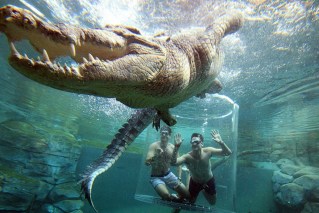Rabies risk after monkey photo bite mishap

Mr Wallace said he didn't want others to go through what he had. Photo: Facebook
A man who was bitten by a monkey while posing for a photo with one of the animals has had rabies shot injections for fear of contracting the deadly disease.
Central Coast man Anthony Wallace was bitten at the Ubud Monkey Forest in Bali while on holiday with his girlfriend.
A doctor in Australia told Mr Wallace after the bite that rabies was almost always fatal following neurological symptoms – or symptoms related to the nervous system – were detected.
• South Australia confirms case of Zika virus
• Popular tourist spots at risk of terror attack
• Backpacking Europe: we give you a basic guide
“If you get rabies, you will die,” the doctor said, however vaccination after exposure could still prevent infection.
Mr Wallace had not had any symptoms but was still concerned for his health.
Before Mr Wallace saw the Australian doctor he had visited a first aid centre in Bali, which told him it was not essential to get rabies shots.
“He [Balinese first aid official] said the monkeys get tested for rabies once a year by an Australian doctor and the monkeys don’t have rabies, but it was up to me if I wanted a rabies shot,” Mr Wallace told Fairfax Media.
His ordeal prompted the traveller, 43, to warn fellow Australians of the dangers of monkeys when overseas.
Mr Wallace chose to undergo treatment in Australia, which included an immunoglobulin injection into the bite wounds.
“I had four injections into my scalp,” he said. “The right side of my head was puffed up like a balloon.”
Following the initial shots, Mr Wallace must have four more shots of rabies vaccine over two weeks.

Mr Wallace said he didn’t want others to go through what he had. Photo: Facebook
Mr Wallace described the experience as “not something you’d like to see others go through”.
The monkey was sitting on Mr Wallace’s head when it dropped a banana it was holding.
Mr Wallace had given the monkey the banana when it initially jumped on his back.
The monkey bit Mr Wallace after dropping the fruit. Mr Wallace said he did not touch or provoke the monkey in any way.
The couple did not take a backpack, sunglasses or hats to the forest, to ensure the monkeys had nothing to grab.
“They had signs saying ‘don’t stare at or tease the monkeys’,” Mr Wallace said.
The Department of Foreign Affairs and Trade SmartTraveller website recommended people “avoid direct contact” with monkeys, dogs and mammals in general because of a rabies risk in Indonesia.
A fact sheet written by World Health Organisation said rabies infection “causes tens of thousands of deaths every year, mostly in Asia and Africa”.
“Rabies is a vaccine-preventable viral disease which occurs in more than 150 countries and territories.”
Dogs caused the most human deaths from rabies. More than 15 million people a year received post-bite treatment.
The disease exists on all continents except Antarctica.








